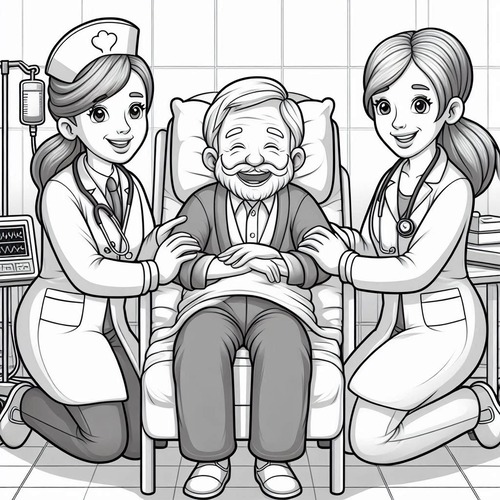Eldercare: How Do We Blend Faith and Compassion?
How can Christians blend faith and compassion in providing eldercare? The question As Christians, we are called to uphold the sanctity of life as a precious gift from God. Genesis 1:27 states, “So God created mankind in His own image, in the image of God He created them; male and female He created them.” This affirms the inherent value of every human life. Similarly, Jeremiah 1:5 reveals God’s intimate involvement in our creation: “Before I formed you in the womb I knew you, before you were born I set you apart.” These passages emphasize life is sacred and ordained by God.
We recognize, too, that our time on earth is temporary. Psalm 139:16 says, “Your eyes saw my unformed body; all the days ordained for me were written in your book before one of them came to be.” Ecclesiastes 3:2 reminds us there is “a time to be born and a time to die.” These verses teach us to entrust our lives and the lives of those in our care to our Maker, who has sovereignly appointed our time on earth.
The Purpose of Palliative and Hospice Care: Palliative and hospice care focus on providing comfort, dignity, and quality of life to those who’re terminally ill, or facing imminent death. This approach aligns with the biblical mandate to “bear one another’s burdens” (Galatians 6:2) and to extend compassion to the suffering, as Jesus taught: “I was sick and you looked after me” (Matthew 25:36). James 1:27 also underscores the importance of caring for the vulnerable: “Religion that God our Father accepts as pure and faultless is this: to look after orphans and widows in their distress…”
Rejection of Euthanasia and Assisted Suicide: Providing compassionate care cannot involve hastening death or taking life into our own hands. Job 1:21 declares, “The Lord gave and the Lord has taken away; may the name of the Lord be praised.” Deuteronomy 32:39 reinforces God’s sovereignty over life and death: “See now that I myself am he! There is no god besides me. I put to death and I bring to life…” Euthanasia and assisted suicide also violate the commandment, “You shall not murder” (Exodus 20:13; Deuteronomy 5:17).
Alignment with Scripture: Palliative care and hospice care do not inherently conflict with these principles. They aim to manage pain and symptoms, provide emotional and spiritual support, and allow for a natural and peaceful transition when death is imminent. This reflects the biblical call to “comfort the feeble-minded, support the weak” (1 Thessalonians 5:14) and to “weep with those who weep” (Romans 12:15). These forms of care respect the natural process of dying without accelerating it.
The Scriptures teach us to respect the dignity of every human being created in the image of God. Genesis 1:27 and Psalm 8:5 highlight this inherent worth. Palliative care and hospice care uphold human dignity by treating patients with compassion, respecting their wishes, and ensuring their comfort and peace in their final days.
Christians approach end-of-life care with a balance of reverence for life, compassion for the suffering, and trust in God’s sovereign plan. We utilize palliative and hospice care when appropriate, ensuring these practices do not intentionally hasten death or undermine the sanctity of life.
Hope in Eternal Life: Throughout this difficult journey, we cling to the hope of eternal life promised in Christ Jesus. John 3:16 assures us, “For God so loved the world that he gave his one and only Son, that whoever believes in him shall not perish but have eternal life.” 1 Corinthians 15:54-57 celebrates the victory over death through Christ: “Death has been swallowed up in victory… But thanks be to God! He gives us the victory through our Lord Jesus Christ.” Finally, Psalm 23:4 offers comfort: “Even though I walk through the darkest valley, I will fear no evil, for you are with me; your rod and your staff, they comfort me.”
By integrating these scriptural principles, Christians can navigate the complexities of end-of-life care with wisdom, compassion, and faith.
Blending Faith and Compassion in Eldercare: Managing Christian Hospices Christian hospices hold a sacred responsibility to provide not only excellent palliative care but also to minister to the spiritual needs of those in their care. This may involve several key practices:
Regular times of prayer, worship, and devotion should be integrated into the daily routine, creating an atmosphere of peace and spiritual nourishment. Hospice staff and volunteers can lead these times of corporate worship and prayer. Despite the end-of-life challenges that residents face, care must be taken to ensure the hospice environment is one of joyful fellowship. Times of singing, sharing of testimonies, and mutual encouragement in the faith can uplift spirits.
While corporate worship is vital, each resident should also have ample time alone to pray, read Scripture, and commune with the Lord in the privacy of their room or a quiet space. To those not already in a relationship with Christ, the good news of salvation may be shared thoughtfully and non-intrusively by hospice staff and chaplains. The aim is to gently introduce them to the love of Jesus, so they can find eternal hope and make peace with their Creator before it is too late.
Christian hospices would do well to clearly inform new residents on admission that daily prayer, worship, and fellowship activities will be part of the regular schedule. This will allow residents to decide if this aligns with their values before joining the community.
Such an approach, balancing spiritual discipleship by blending faith and compassion in eldercare, will help Christian hospices become beacons of hope, comfort, and peace in residents’ final days.
Related Reads:
Editor's Pick

Should We Stop Using Male Pronouns for God? Why Do We Say No?
A friend of ours arrived eagerly at his first theology class in seminary. But he quickly discovered something troubling: the [...]

Did Old Testament Law Force Women to Marry their Rapists?
**Editor’s Note: This post is part of our series, ‘Satan’s Lies: Common Deceptions in the Church Today’… Viral misinformation abounds [...]

From Danvers To Nashville: Two Statements, One Biblical Vision
30 years separate the Danvers Statement on Biblical Manhood and Womanhood (1987) and the Nashville Statement on Human Sexuality (2017). [...]

The Nashville Statement: Why Affirm It Despite Media Backlash?
WHY DO REFORMED CHRISTIANS STAND BY THIS STATEMENT ON MARRIAGE AND GENDER? When the Nashville Statement was released in 2017, [...]

Who Is Belial? Solving The 2 Corinthians 6:15 Mystery
Belial: This name from the pages of Scripture chills the soul. Who is this mysterious figure Paul invokes in 2 [...]

Celibacy Or Castration: What Jesus Really Means in Matthew 19:12
One of Scripture's most shocking misinterpretations led theologian Origen to castrate himself in the third century. His tragic mistake? Taking [...]

Philippians 4:13: Did Paul Really Mean We Can Do ALL Things?
"I can do all things through Christ who strengthens me." It's on gym walls, graduation cards, and motivational posters everywhere. [...]

The Ordinary Means of Grace: Why Are They Indispensable?
ORDINARY MEANS FOR EXTRAORDINARY TRANSFORMATION What if God's most powerful work in believers' lives happens through the most ordinary activities? [...]

Is the Bible God’s Word? Or Does It Only Contain God’s Word?
The authority of Scripture stands at the crossroads of modern Christianity. While some argue the Bible merely contains God’s Word [...]

Will We Remember This Life in Heaven? What Isaiah 65:17 Means
"Will I remember my spouse in heaven? My children? Will the joy we shared on earth matter in eternity?" These [...]
SUPPORT US:
Feel the Holy Spirit's gentle nudge to partner with us?
Donate Online:
Account Name: TRUTHS TO DIE FOR FOUNDATION
Account Number: 10243565459
Bank IFSC: IDFB0043391
Bank Name: IDFC FIRST BANK






